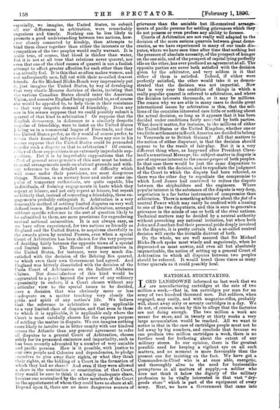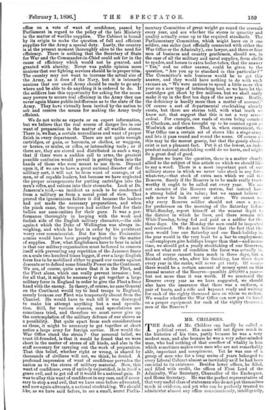NATIONAL STOCKTAKING. T OED LANSDOWNE informed us last week that we
J are manufacturing cartridges at the rate of two million a week,—that is, ten cartridges per man for an army of two hundred thousand men. But soldiers, when engaged, may easily, and with magazine-rifles, probably will, shoot away sixty or seventy cartridges in a day. We do not, of course, mean by this to allege that the factories are not doing enough. The two million a week are meant for store, and in twenty or thirty weeks a very large accumulation would be reached. All we want to notice is that in the case of cartridges people must not be led away by big numbers, and conclude that because we can produce two million cartridges a week, there is no further need for bothering about the extent of our military stores. In our opinion, there is the greeteet possible need for keeping a vigilant eye on all such matters, and no moment is more favourable than the present one for insisting on the fact. We have got a Commander-in-Chief who is at once able, energetic, and thoroughly alive to the need for businesslike promptness in all matters of supply,—a soldier who does not think it below the dignity of the military profession to be vitally interested in that vast "dry- goods store" which is part of the equipment of every army. Next, we have a Government that came into office on a vote of want of confidence, passed by Parliament in regard to the policy of the late Ministry in the matter of warlike supplies. The Cabinet is bound by its origin to make the question of full and efficient supplies for the Army a special duty. Lastly, the country is at the present moment thoroughly alive to the need for efficiency. There is nothing that the Secretary of State for War and the Commander-in-Chief could ask for in the cause of efficiency which would not be granted, and granted with alacrity. Never was public opinion more anxious that our fighting services should be in proper trim. The country may not want to increase the actual size of the Army, as it does of the Navy, but it is intensely anxious that our small Army should be ready to go any- where and be able to do anything it is ordered to do. If the soldiers lose this opportunity for asking for the neces- sary powers to secure real efficiency in the Army they can never again blame public indifference as to the state of the Army. They have virtually been invited by the nation to ask and receive the means for making the Army truly efficient.
We do not write as experts or on expert information, but we believe that the real source of danger lies in our want of preparation in the matter of all warlike stores. There is, we fear, a certain unreadiness and want of proper finish in every department. There are not quite enough cartridges, or guns, or bayonets, or clothes, or waggons, or horses, or mules, or rifles, or intrenching tools ; or if there are, they are stored and distributed in such a way, that if there were a sudden call to arms, the greatest possible confusion would prevail in getting them into the hands of those who were meant to use them. Depend upon it, if we are to have a great national disaster of the military sort, it will not be from want of courage, or of men, or of capable leaders, but because we have neglected the proper arrangements for putting cartridges into the men's rifles, and rations into their stomachs. Look at Dr. Jameson's raid,—an incident as much to be condemned from a military as from a. moral point of view. That proved the ignominious failure it did because the leaders had not made the necessary preparations, and when the pinch came, the troopers had neither food for their bellies nor ammunition for their guns. It was a per- formance thoroughly in keeping with the weak and foolish side of the English military character,—the side againkt which the Duke of Wellington was always in- veighing, and which he kept in order by his persistent worry over commissariat. But for him the Peninsular armies would have been grossly neglected in the matter of supplies. Now, what Englishmen have to bear in mind is that our military organisation must be forced to concern itself lyith preventing any repetition of the Jameson fiasco on a scale two hundred times bigger, if ever a large English force has to be mobilised either to guard our coasts against descents or to defend some friendly Power on the Continent. We are, of course, quite aware that it is the Fleet, and the Fleet alone, which can really prevent invasion ; but, for all that, it might be necessary to get together a large military force in England in order to give the Fleet a freer hand with the enemy. In theory, of course, no sane General on the Continent would try to land troops in England, merely because our Fleet was temporarily absent from the Channel. He would have to wait till it was destroyed to make his attempt anything but a mad specula- tion. Still, for various reasons, mad speculations are sometimes tried, and therefore we must never give up the contemplation of the military defence of our shores as a possibility. But quite apart from such considerations as these, it might be necessary to get together at short notice a large army for foreign service. How would the War Office stand the strain ? Our personal belief, we trust ill-founded, is that it would be found that we were short in the matter of stores of all kinds, and also in the staff necessary for carrying out the work of preparation. That this belief, whether right or wrong, is shared by thousands of civilians will not, we think, be denied. A profound impression of want of confidence pervades the nation as to the stores of military material. Now, this want of confidence, even if entirely unjustified, is in itself a grave evil, and to get rid of it would be a national gain. It was to allay this want of confidence in any case, and if neces- sary to stop a real evil, that we have once before advocated, and now again advocate, a national stocktaking. We should like, as we have said before, to see a small, secret Parlia- mentary Committee of great weight go round the arsenals every year, and see whether the stores in' quantity and quality actually come up to the required standards. The Parliamentary Committee, which might have on it one soldier, one sailor (not officially connected with either the War Office or the Admiralty), one lawyer, and three or four men of business and country gentlemen, should see, in the case of all the military and naval supplies, from shells to spades, and horses to extra boiler-tubes, that the answer "Yes," and no other answer, could be given to the question, "Are you up to standard in this particular?" The Committee's sole business would be to get this answer, and they would have nothing, to do with such excuses as, "We were anxious to spend a little more this year on a new type of intrenching tool, so we have let the cartridges get short by five millions, but we shall easily make it up in the first ten days of the new year. Really, the deficiency is hardly more than a matter of account." Of course a sort of departmental stocktaking already exists, but there are stories told, with what truth a,. know not, that suggest that this is not a very sever' ordeal. For example, one reads of stores being counte.! at Chatham, and then brought up to be counted again a. Woolwich or elsewhere. That is, when convenieut, the War Office use a certain set of stores like a stage-arm■ . and lets it pass round and round the scene. Of course a:: this may be the merest gossip, but that the gossip shoul,:, exist is not a pleasant fact. Put it at the lowest, an inde- pendent national stocktaking could do no harm, and might do a great deal of good.
Before we leave the question, there is a matter closely allied to the subject of this article on which we should bk.. to say a word. There is a most important part of our military stores in which we never take stock in any form whatever,—that stock of extra men which we call tie Reserve. Surely if the Reserve is to be made really trust- worthy it ought to be called out every year. We are not enemies of the Reserve system, but instead hay, a strong belief in its value ; but we cannot believe i - safe never to look over our store. We cannot sc., why every Reserve soldier should not once a yea!, for preference on the morning of the Saturday before Whit-Sunday, report himself at the nearest depot to the district in which he lives, and there remain till Whit-Tuesday, being fed and paid as a soldier for the three days. On the Monday the men could be inspected and reviewed. We do not believe that the fact that the men would lose one Saturday and one Bank-holiday in the year would in the very least be a bar to employment —all employers give holidays longer than that—and mean- time, we should get a yearly stocktaking of our Reserves, and see what sort of condition the force was actually in. Men of course cannot learn much in three days, but a finished soldier, who, after his finishing, has three days every year in the ranks, will never get rusty. Of cuur.e there would be a certain amount of money spent on this annual muster of the Reserve—possibly £.80,000 a year— but not more than it was worth. If we mustered the Reserve every year as we have suggested, we should also have the assurance that there was a uniform, a. pair of boots, and a rifle and bayonet ready and waiting for each of the eighty thousand men on whom we reckon. We wonder whether the War Office can now put its hand on a proper equipment for each of the eighty thousaml men of the Reserve ?







































 Previous page
Previous page